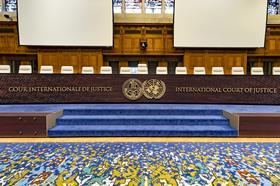A call by lawyers for measures against Israel over the war in Gaza is based on a mistaken reading of an International Court of Justice (ICJ) ruling on genocide, according to a letter of riposte. The new letter has attracted more than 1,300 signatures, its authors, the group UK Lawyers for Israel, said today.

They were responding to last week's letter to the prime minister signed by 613 lawyers, including three former Supreme Court justices, calling for a halt on arms exports to Israel. That letter cited a provisional order of the ICJ which it said 'concluded that there was a plausible risk of genocide in Gaza'.
The new letter states that the quote is incorrect: the ICJ's provisional measures order ruled in January that Palestinians in the Gaza Strip 'have plausible rights to be protected from acts of genocide'. It continues: 'The court’s ability to issue a provisional measures order depends on a finding that the rights asserted by the party seeking the order are at least plausible. It is of course plausible that Palestinians in the Gaza Strip have rights to be protected from acts of genocide. Thus, it is the rights of the Palestinians in the Gaza Strip that were determined to be plausible, and not the alleged commission of genocide against them.'
UK Lawyers for Israel goes on to state that the lawyers' letter claims wrongly that the ICJ's order places legal obligations on the UK. Rather, it is legally binding only on the parties to the proceedings: Israel and South Africa. The letter is also criticised for relying on casualty figures supplied by Hamas-run Gaza Ministry of Health.
Jonathan Turner, chief executive of UK Lawyers for Israel, said: 'Rishi Sunak must not give in to ill-founded calls to turn his back on Israel. There is now a growing number of legal experts publicly urging the prime minister to ignore calls for an arms embargo that are based on erroneous legal claims and Hamas propaganda.'
Signatories to the new letter include former Supreme Court justice Lord Dyson, Lord Macdonald, a former director of public prosecutions, and former justice minister Lord Wolfson.


























